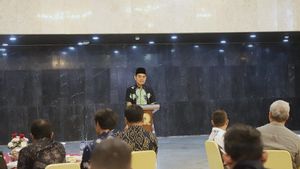JAKARTA - Coordinating Minister for Maritime Affairs and Investment (Menko Marves) Luhut Binsar Pandjaitan continues to claim that the COVID-19 pandemic situation is under control. On the other hand, data and facts show otherwise. Can this be called a hoax? If so, then this is the most dangerous hoax.
Yesterday, at an online press conference, Luhut dismissed the notion that the COVID-19 pandemic situation in Indonesia was out of control. Luhut also challenged opposing parties to meet him. "Later I will show his face that we are under control," said Luhut.
Like his men today. Previously, Jokowi had claimed the government's success in dealing with the pandemic. At that time, in January, Jokowi mentioned two crises caused by the pandemic: the economic and health crises. The two crises, said Jokowi, were successfully controlled.
"We are grateful that Indonesia is one of the countries that can control these two crises well," said Jokowi at the Full Workers' Assembly (MPL) of the Communion of Churches (PGI) in Indonesia on the Yakoma PGI YouTube channel, Monday, January 25.
Is it really under control?
On Sunday, July 11, Indonesia recorded 1,007 deaths from COVID-19. This figure is the second highest death record in the world. Indonesia overtakes India. A few days earlier, Friday, July 9, Indonesia also broke the daily COVID-19 case record previously held by India.
That day Indonesia recorded 38,391 positive cases. This figure is well above India which recorded 34,443 one day earlier, Thursday, July 8. The latest data quoted from the COVID-19 Task Force, Tuesday, July 13 shows that Indonesia broke its own record with 47,899 daily positive cases.
With this, the total number of positive COVID-19 cases in the country has reached 2,615,528. Of the total cases, 68,219 of them died. Is this record addition of cases a good sign of ongoing testing and tracing? Unfortunately it doesn't look like that.
We look at the data on case growth and related variables, such as the number of specimens examined and the test positivity rate (TPR) in the past two weeks, to be precise since the Implementation of the Emergency Community Activity Restrictions (PPKM) on July 3 to July 13.
On July 3, which is the first day of Emergency PPKM, there were 14,138 new cases from 110,983 examinations. From that figure, a TPR of 25.2 percent was obtained. Meanwhile, on July 13, as described above, 47,899 new positive cases were found from 159,354 examinations. TPR recorded, 30 percent.
TPR only grew by about 5 percent. Meanwhile, the number of deaths has doubled. On July 3, the daily death toll was 493. On July 13, authorities recorded 864 people died from COVID-19. It is recorded in the data that 34 provinces and 510 districts/cities have been infected with the corona virus.

The spike in cases, as described above, has resulted in the collapse of the health system. Hospitals are no longer able to accommodate COVID-19 patients. Health workers fall. In the midst of the chaos, it was the turn of the Ministry of Health (Kemenkes) to give a 'calming' narrative.
At that time, Siti Nadia Tarmizi, the Director of Prevention and Control of Vector and Zoonotic Infectious Diseases at the Directorate General of Disease Prevention and Control of the Ministry of Health, responded to Tempo's question about health facilities that were deemed to have collapsed.
"No collapse. But overcapacity, yes. Because the number of patients is very large and at the same time," said Nadia.
Friday, July 9, the Executive Board of the Indonesian Doctors Association (IDI) said the hospital was in the functional collapse phase because many health workers had contracted COVID-19, and even died. Hospitals are also experiencing a shortage of medicines and medical equipment.
"If I speak as a person who works in disasters, the current condition in hospitals and health workers is functional collapse. We are not experiencing a structure collapse but functional. There needs to be an effort to be made, this is just a downstream problem," said the Team Leader. Adib Khumaidi, the Executive Board of the Indonesian Doctors Association (IDI).
Out of control from the start
Jokowi's statement in January 2021 that his government had successfully handled the pandemic and its crisis was also questioned. It was the Chairman of IDI, Slamet Budiarto, who had questioned that from the start. He admitted that he was confused about what indicators Jokowi's statement was based on.
"I don't understand Pak Jokowi saying that. Maybe from an economic perspective. I also don't know what kind of economy it is. What I do know is from a health perspective," said Slamet, written by Kompas.com.
The COVID-19 pandemic in Indonesia has never been under control. Even in the past months, when we thought the situation was improving, we were actually in the silence outbreak position. The COVID-19 pandemic in Indonesia has been out of control from the start. What we are experiencing today is the payoff.
Many consider the explosion of cases today as the impact of human movement in the Lebaran season. May be. Another version calls the new variant of COVID-19 Delta the culprit in the explosion of cases. Can be. But there is another, more serious problem.
As explained in the BERNAS article entitled Shocked by the COVID Storm We Created Ourselves, today's explosion of cases could be the accumulation of mishandling over the course of a year. And today's problem is something that many experts have predicted.
"I once predicted at the beginning of the year that in the first six months of 2021 we will experience a very critical period," Griffith University epidemiologist Dicky Budiman told VOI.
"Because the critical first three months are a response to prevention. Because this wave will increase towards the peak. And it is a one-year accumulation. So it can be predicted that the saturation point will be reached in June-July. That's the threat," added Dicky. .

We need to go back to April 2020 to dive into Dicky's modeling logic. At that time, the World Health Organization (WHO) determined that Indonesia's COVID-19 pandemic situation had reached the level of community transmission or local transmission, one of the worst sirens in a pandemic.
At the community transmission level, the authority -- state, city or state -- ideally establishes a total lockdown. Fiji, Brisbane, to Gaza are in total lockdown when they hit that level. But what did the Indonesian government do at that time?
There is slack in terms of government policy. Dicky alluded to three basic strategies for handling the pandemic - 3T (testing, tracing, treatment), vaccination, and restriction of mobility - which did not work well. This can be seen from the modeling showing the wavelength of COVID-19 in Indonesia.
"Then the government's response is getting better, stronger, the peak is reached quickly, it slopes quickly. That's the good thing. So if there is a country whose waves are long, long, it means that the intervention was unsuccessful."
"Indonesia has been at the community transmission level since April 2020 until now. This means that there are many cases of infection and this cluster is not detected so that it continues to grow, this case breeds."
Dangerous hoax from the governmentThe Journal of Hoax Communication Interactivity in Social Media and Anticipation compiled by Christiany Juditha and published by the Research and Development Center for Information and Information Applications for Public Communication of the Ministry of Communications and Informatics explains the definition of hoax.
Hoax is a word used to indicate false news or an attempt to deceive or trick the reader into believing something. "Reports that are not based on reality or truth (nonfactual) for a particular purpose," wrote the journal.
Epidemiologist from the Faculty of Public Health, University of Indonesia (FKM UI), Pandu Riono briefly answered our questions regarding the truth about the controlled pandemic situation as stated by Luhut. "Jokowi was successfully deceived by Luhut," said Pandu to VOI.
A public policy analyst from Trisakti University, Trubus Rahadiansyah, also smells lies in the narratives formed by the government. From a public policy perspective, what Luhut, Jokowi, and other government officials are doing is termed the 'mindset background'.
The government deliberately creates an optimistic illusion to form a positive impression on government policies. "The construction keeps it positive even though there are actually hoaxes. But it's a reconstruction to make the policy seem respected. Consistent," Trubus, told VOI.
This illusion was also created so that the government could implement policies to control COVID-19 according to their wishes, not based on reality and public interest. "Even though the reality is contradictory, it is considered temporary. It is considered like a sharp pebble that must be passed," added Trubus.
And just so you know. The characteristics of this attitude are closely attached to countries that follow authoritarian systems. Authoritarian states build their public policies with elitist values. And to attract public support and participation, these kinds of illusions are usually narrated.
"So the public's belief must be built, based on information that is in the same direction. The sound is only ... So on that belief then all factors, reality is denied for the sake of achieving a target," said Trubus.
"Usually such policies are built by countries with authoritarian categories. Democrats are more participatory and aspirational. Then the policy can be deflected," he added.

The dangers of hoaxes are those produced by the government. As explained in the BERNAS article entitled Health Hoaxes Are More Dangerous when the Government Participates in Producing them, in the context of communication, hoaxes recognize a hierarchy of information.
This means that the information submitted by the authorities will have a greater impact. And when the information is false, imagine the wrong attitudes and decisions people make. In a health crisis situation like this, hoaxes from the authorities have a very destructive impact.
"Because our society is a hierarchical society, hoax statements that come out of a community leader, religious leader, official are certainly not the same as if they leave the ordinary community because the impact will be greater," said Chairman of the Presidium of the Indonesian Anti-Defamation Society (Mafindo) Septiaji Eko Nugroho to VOI.
*Read other information about COVID-19 or read other interesting articles from Yudhistira Mahabharata.
Other BERNASThe English, Chinese, Japanese, Arabic, and French versions are automatically generated by the AI. So there may still be inaccuracies in translating, please always see Indonesian as our main language. (system supported by DigitalSiber.id)













